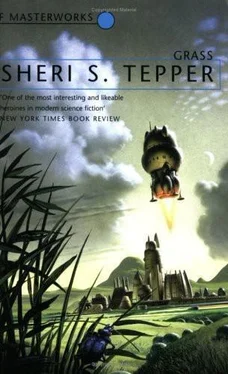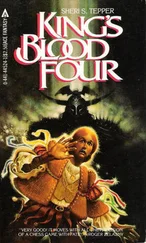Sheri Tepper - Grass
Здесь есть возможность читать онлайн «Sheri Tepper - Grass» весь текст электронной книги совершенно бесплатно (целиком полную версию без сокращений). В некоторых случаях можно слушать аудио, скачать через торрент в формате fb2 и присутствует краткое содержание. Город: London, Год выпуска: 2002, ISBN: 2002, Издательство: Gollancz, Жанр: Фантастика и фэнтези, на английском языке. Описание произведения, (предисловие) а так же отзывы посетителей доступны на портале библиотеки ЛибКат.
- Название:Grass
- Автор:
- Издательство:Gollancz
- Жанр:
- Год:2002
- Город:London
- ISBN:9781857987980
- Рейтинг книги:4 / 5. Голосов: 1
-
Избранное:Добавить в избранное
- Отзывы:
-
Ваша оценка:
- 80
- 1
- 2
- 3
- 4
- 5
Grass: краткое содержание, описание и аннотация
Предлагаем к чтению аннотацию, описание, краткое содержание или предисловие (зависит от того, что написал сам автор книги «Grass»). Если вы не нашли необходимую информацию о книге — напишите в комментариях, мы постараемся отыскать её.
Grass — читать онлайн бесплатно полную книгу (весь текст) целиком
Ниже представлен текст книги, разбитый по страницам. Система сохранения места последней прочитанной страницы, позволяет с удобством читать онлайн бесплатно книгу «Grass», без необходимости каждый раз заново искать на чём Вы остановились. Поставьте закладку, и сможете в любой момент перейти на страницу, на которой закончили чтение.
Интервал:
Закладка:
“Sylvan, Papa has beaten Mama and locked her in the old wing. Emmy’s waiting there. Mama’s got no food, no water, Sylvan. Emmy and I think he means to leave her there…”
She was talking to the chair. Sylvan was up and gone.
In the first light of morning Sebastian Mechanic came to the estancia, where he found Marjorie having a very early breakfast. In answer to her request, he pointed a direction, though unwillingly, suggesting to her that going out into the grasses alone was not a good idea. He did not like the look of her. Her eyes were haunted and she was too thin. Some deep tiredness seemed to oppress her. Despite her appearance of weariness, perhaps illness, she was sensible enough to agree with him that it would be foolish to go into the grasses. She told him she had simply been curious, then asked after his wife and family and made small talk with disarming patience and charm.
When he, assured that she had been merely inquisitive, had gone back to his work, Marjorie went out to the stables and saddled Don Quixote. It was not part of her intention to tell anyone where she was going, though she did leave a message with one of the grooms.
“If I’m not back by dark,” she said, “but not before then, tell my husband or son I’d like him to come look for me in the aircar. I’m carrying a beacon, so I should be easy to find.” The personal beacon was strapped to her leg under her trousers. Any sharp blow would set it off. If she were thrown from a horse, for example. Or if she struck it sharply with her fist. She was carrying a trip recorder of the type used by cartographers, which would serve as a direction finder. She had a laser knife with her as well, to clear her way through tall grass if that became necessary. She showed both of these to the stableman, telling him what they were for. She wanted everything about her journey to speak of purpose. She wanted no one to suppose that she had planned not to come back. It was a risk, that’s all. Still, if something happened to her, it would solve Rigo’s problem. And Stella’s. And her own. Resolutely, she did not think of Tony.
Quixote pawed the soil, flickers of movement running up his twitching hide from fetlocks to withers and down again. Not nerves, not precisely. Something more than that. It was a kind of agitation Marjorie was unfamiliar with, and she stood for a long time stroking his legs, talking to him, trying to imagine what had brought him to this state. He leaned into her, as though for support, yet when she mounted him he trotted out into the grasses as though for a ride on any ordinary day. He meant by this that he trusted her. Though he might die of it, he trusted her. He could not quite keep the nervous quiver from his skin, however, and the message eventually reached her after they had traversed some little distance. She flushed, ashamed to be using him in this fashion when his own nature spoke so strongly against it. She stroked him. expressing her own trust. “Father James says God has made viruses of us, Quixote, but I suppose one virus may still love another, or have another kind of virus as a friend. I won’t put you into a trap, my friend. I won’t let you get close enough for that.” And myself? she thought. Shall I put myself in danger?
Suicide was forbidden, but much glory was given to martyrs. If she killed herself, would God even notice? According to what Father James had said, God probably did not know which of His viruses were involved in doing His work. To God, she had no name. No individuality. If she killed herself, would He even know? Did it matter if He knew? When He had created her, had He also created a mechanism for saving her soul? Did viruses even have them?
Still, there had been all those years of being taught it was wrong to take one’s own life. She would not feel right about getting herself purposely killed off. She could take a calculated risk, however. If she died, it would be accidentally, and Don Quixote would survive. Fleet as the wind, Quixote. Without her on his back he could outrun the devil himself. So she told herself before she stopped thinking about it. devoting most of her energy to not thinking of it. She could not help wondering about Rigo’s reaction if she didn’t return. “That silly fool.” he would say. “That silly woman who never loved me as she ought.”
She did love him. Or. she wanted to love him. Wanted to love him and wanted to love Stella with a desire that poured out hurtfully until she was exhausted from the flow of it. At home, she had known about Eugenie, and the one before Eugenie, but they had not been nearby. At home, Stella had had distractions and friends. Here, both Stella and Eugenie beat at her like huge trapped birds, pecking at her. Their frustrations hammered at her. She had not expected to feel weak, to be sleepless, to feel the threat of death always at her back. Each day on Grass had taken a little more of her strength, a little more of her purpose. Lately she had felt no hope, she who had always lived from disappointment to disappointment on a childlike, hopeful optimism which she could now barely remember.
She rode past the little arena where the horses were exercised, a place that lay just outside the grass gardens of Opal Hill, though it seemed remote because of the topography. Now, for the first time, Marjorie was leaving the close confines of that area which those who defined such things considered to be the estancia. The gardens were behind her. The prospects that the gardens overlooked were behind her. She was entering upon the wild grasses, the surface of the planet, the part into which men and their works and their creatures were not allowed to intrude. She rode, eyes forward, not thinking about anything very much except that she was unhappy enough that if the Hippae were to be found, out here in the grass, perhaps she would learn something useful about them or they would kill her, and she did not at that moment much care which.
The howl, when it came, made Don Quixote tremble, ears up, stopping dead still. Marjorie sat, scarcely breathing, aware that the howl had come from behind her. In that instant she remembered Janetta bon Maukerden and realized that the Hippae, if they found her, might do less — or more — than kill her. She had considered that they might kill her and had accepted that. She had not considered the range of alternatives which might result from her behavior, and she was abruptly both shamed and terrified.
They had been following a kind of trail, a winding path of short grasses among the taller ones. She urged Don Quixote off this easy way and into the taller grass, dismounting to tug stems into line to hide the way she had come.
“They’ll smell you,” she told herself, trying to quell her alarm by moving slowly and deliberately. The wind was blowing toward her from the direction the howl had come. That one would not smell her. Some other one might. It would be wise to return. Overwhelmed with the stupidity of what she had been doing, she told herself that returning would be the best possible thing to do.
She opened the trip recorder, watching it as she guided the stallion in a shallow turn which ended with him headed back toward the embassy, still hidden in tall grass, now traveling toward whatever it was she had heard. He went only a little way, then stopped. Something howled again, quite close, between them and the embassy.
The horse turned and walked quietly on his own trail. When Marjorie attempted to guide him, he ignored her. After one brief spasm of panic, she sat quietly, letting him alone. So. So, he knew something she didn’t. Smelled something she couldn’t. Felt something she couldn’t. She sat still, not bothering him, trying to say an act of contrition, unable to remember phrases she had known since childhood. The words didn’t fit, anyhow. How could she be heartily sorry for having offended God when, for all she knew, she was doing exactly what God intended!
Читать дальшеИнтервал:
Закладка:
Похожие книги на «Grass»
Представляем Вашему вниманию похожие книги на «Grass» списком для выбора. Мы отобрали схожую по названию и смыслу литературу в надежде предоставить читателям больше вариантов отыскать новые, интересные, ещё непрочитанные произведения.
Обсуждение, отзывы о книге «Grass» и просто собственные мнения читателей. Оставьте ваши комментарии, напишите, что Вы думаете о произведении, его смысле или главных героях. Укажите что конкретно понравилось, а что нет, и почему Вы так считаете.












